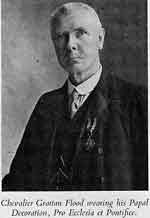Thomas Moore’s poem, When Cold In The Earth is sung to the air Limerick’s Lamentation.
This melody is much before Thomas Moore’s time, and its use dates back to 1691 (William Henry Grattan Flood).

It was first published in 1726 in Neales’ Collection of the ‘Most Celebrated Irish Tunes.
William Henry Grattan Flood was born in 1859 in Lismore, Ireland, he died in 1928 in Enniscorthy. He was an important collector of Irish folk-melodies.
He edited an edition of Thomas Moore’s Irish Melodies (The Spirit of a Nation) in 1911. In his own right, he also wrote about musicology – The Story of the Harp (1905), The Story of the Bagpipe (1911) and The History of Irish Music (1927).
Hammered dulcimer
The video below show Dick Glasgow performing the music Limerick’s Lamentation in the Banquet Hall of Carrickfergus Castle, Co. Antrim. He is playing a hammered dulcimer, which which has a long history in Co. Antrim.
He says that this music has been generously passed on down to him, by countless unseen musicians – in the great aural tradition.
When Cold In The Earth Lyrics
When cold in the earth lies the friend thou hast loved,
Be his faults and his follies forgot by thee then;
Or, if from their slumber the veil be removed,
Weep o’er them in silence, and close it again.
And oh! if ’tis pain to remember how far
From the pathways of light he was tempted to roam,
Be it bliss to remember that thou wert the star
That arose on his darkness and guided him home.
From thee and thy innocent beauty first came
The revealings, that taught him true love to adore,
To feel the bright presence, and turn him with shame
From the idols he blindly had knelt to before.
O’er the waves of a life, long benighted and wild,
Thou camest, like a soft golden calm o’er the sea;
And if happiness purely and glowingly smiled
On his evening horizon, the light was from thee.
And tho’, sometimes, the shades of past folly might rise,
And tho’ falsehood again would allure him to stray,
He but turned to the glory that dwelt in those eyes,
And the folly, the falsehood, soon vanished away.
As the Priests of the Sun, when their altar grew dim,
At the day-beam alone could its lustre repair,
So, if virtue a moment grew languid in him,
He but flew to that smile and rekindled it there.
Limerick’s lamentation – Irish or Scottish
Limerick’s lamentation, which is a slow Irish air, is known by various other names, including Lament for Limerick, The Clothiers March, Sarsfield’s Lamentation and Lochaber No More (Scottish version).
There’s dispute over which version came first – Limerick’s lamentation (Irish) or Lochaber No More (Scottish). In the 17th century Myles O’Reilly, a harpist from County Cavan, composed a melody which is now thought to be the common predecessor to both. However, Robin Morton (who has nurtured traditional Scotland music) says evidence shows there may be Scots claim to the tune.
The title, Sarsfield’s Lamentation, was so named after the English defeated Limerick at the end of the Williamite Wars. Commander Sarsfield was the leader of the Irish forces.
Whoever wrote it, this beautiful air is still being played over three hundred years since it was first heard. . .
